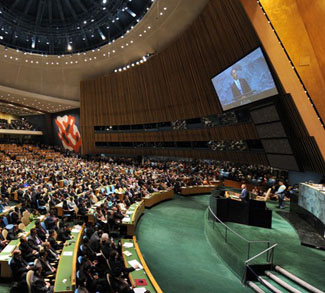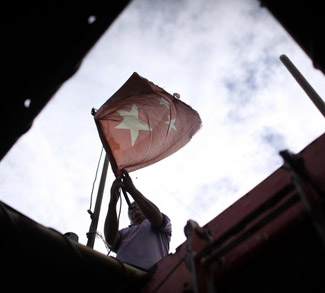In the past six months, Brazilian President Dilma Roussef has mounted an intriguing doctrinal challenge to the ‘Responsibility to Protect’ (R2P) Doctrine with a concept the Brazilian government calls ‘Responsibility while Protecting” (RwP) – demonstrating Brazil’s newfound determination to stake its claim as an ideological heavyweight in international affairs discourse.
In the ten years since the publication of the 2001 International Commission on Intervention and State Sovereignty (ICISS) report, R2P has played an ever greater role in international relations dialogue. At the heart of the concept is the belief that state sovereignty is not a right, but rather a responsibility. If a given state is unable or unwilling to ensure the protection of its citizens from mass atrocities such as genocide, crimes against humanity, ethnic cleansing, and war crimes, it is the responsibility of the international community to intervene and protect these civilians.
In the majority of cases, intervention entails cooperative measures and diplomacy to ensure states have the capacity to ensure the well-being of their citizens. Only in exceptional circumstances, when a given state is completely incapable of preventing crimes against humanity or is itself the perpetrator of the aforementioned crimes, is it the responsibility of the international community to breach state sovereignty and use collective force to the ensure the protection of civilians.
Conceived and realized in the white towers of Toronto and New York, far from the killing fields of South Sudan, Mogadishu or Homs, R2P is a noble and valuable concept that, in its current format, puts posture before pragmatism. Doctrinal ambiguities and political incentives ensure that the practical implementation of the doctrine is rife with contradictions.
NATO’s intervention in Libya is widely perceived by non-Western actors as the misuse of R2P in order to oust a Libyan regime that was for a long time a thorn in the side of Western governments. In this context, Brazil has distinguished itself as a thoughtful proponent of a collective revision of intervention and the international regime. While upholding R2P’s importance as a tool against crimes against humanity, Brazil’s leaders propound a more nuanced framework for sovereignty as responsibility. President’s Rousseff’s ‘Responsibility while Protecting’ (RwP) consists of a series of addendums to the R2P doctrine designed to limit the misuse of the R2P doctrine for neo-colonialist purposes while keeping the founding principles of R2P intact.
“Attention must be paid,” Brazilian officials claim, “to the fact that the world today suffers the painful consequences of interventions that have aggravated existing conflicts, allowed terrorism to penetrate into places where it previously did not exist, given rise to new cycles of violence and increased the vulnerability of civilian populations.” R2P cannot be used, according to the Brazilian government, for purposes other than protecting civilians, such as regime change.
“As it exercises its responsibility to protect,” Brazil’s leaders conclude, “the international community must show a great deal of responsibility while protecting. Both concepts should evolve together, based on an agreed set of fundamental principles, parameters and procedures.” To this end, Rousseff proposes that the authorization of force in an R2P scenario must be limited in its legal, operational and temporal elements and the mandate must be conferred by the Security Council or General Assembly. [1]
To promote the initiative, Brazil organized a series of discussions at the UN, with various countries, and NGO’s. The objective, according to Antonio de Aguiar Patriota, Brazil’s Minister of External Relations, is to broaden the dialogue on R2P and contribute to the debate on the maintenance of international peace and security and the protection of civilians. [2]
By reaching out to like-minded countries and organizations, Brazil is marking itself as a regional leader with growing global aspirations. As one of the few countries that fared well throughout the ‘Great Recession,’ Brasilia is particularly well-poised to assert its brand of global politics in international affairs. Even more, President Dilma Rousseff’s, personal approval ratings have consistently polled above 70 percent – figures that are buttressed by what Brazilians perceive as her pragmatic and measured approach to international affairs. [3]
The argument has been for a long time that if rising powers want to exert greater influence in the Security Council and the international regime, they must first show their willingness to fight for conflict prevention, the protection of civilians, and geopolitical stability. Brazil is showing initiative on all fronts and is gaining plaudits throughout the world for its efforts.
In particular, Brazil is differentiating itself from the negative, reactionary stances of its BRIC counterparts – illustrating once again the contrived nature of the BRIC alliance. While certainly not aligned with more interventionist states like France, the United States, or Canada, Brazilian foreign policy is decidedly middle-of-the-road when compared to Russia and Chinas’ stance on foreign intervention.
Russia and China’s outright rejection of any foreign intervention is increasingly out of sync with political norms since Rwanda and Kosovo, most state actors recognize. Thus, in the words of the Costa Rican delegate to the UN, the discussion on RwP is welcomed to enhance the norm’s (R2P) implementation. RwP simply raises legitimate concerns on the application of the use of force; concerns “of an operative, rather than conceptual nature.” [4]
Given the disjunct between the operational implementation and normative theory of R2P, many state actors, led by Brazil, see the implementation of RwP as imperative to R2P’s viability. Conversely, Brazil’s initiative, fuelled by widespread international national support, is showing that Western government can ill afford to ignore the politics of the South if they want to cement the R2P doctrine in the international regime and ensure the prevention of mass atrocities.
Victor MacDiarmid is has a graduate degree from the University of Toronto in the History of International Relations and is also the co-chair of the Canadian Centre for the Responsibility to Protect.
Sources:
[1] Letter dated 9 November 2011 from the Permanent Representative of Brazil to the United Nations addressed to the Secretary-General, General Assembly, Sixty-sixth session Agenda items 14 and 117: http://www.globalr2p.org/media/pdf/Concept-Paper-_RwP.pdf
[2] Statement by H.E. Ambassador Antonio de Aguiar Patriota Minister of External Relations of the Federative republic of Brazil, Informal Discussion at the United Nations on the “Responsibility while Protecting,” 21 February, 2012: http://www.un.int/brazil/speech/12d-agp-RESPONSIBILITY-WHILE-PROTECTING.html
[3] Paulo Sotero, Brazil’s President Dilma Roussef makes her mark, BBC, 29 December 2011: http://www.bbc.co.uk/news/world-latin-america-16288184
[4] Embajador Eduardo Ulibarri, Represente Permanente, “La responsabilidad de proteger y al proteger,” Nueva York, 21 de febrero 2012: http://www.responsibilitytoprotect.org/Costa%20Rica%2021%20Feb%20RwP%20_%20espanol.pdf
Statement by William Awinador-Kanyrige, Deputy Permanent Representative of Ghana to the UN, Informal Discussion on Responsibility While Protecting, New York February 21, 2012: http://globalr2p.org/media/pdf/GhanaRWP.pdf




